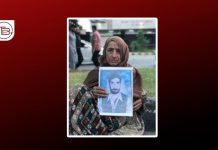In a unified response, various bar associations, including the Pakistan Bar Council, Balochistan Bar Council, Balochistan High Court Bar Association, High Court Bar Associations of Sibi, Kech, Turbat, and Quetta Bar Association, have announced a complete boycott of court proceedings across Balochistan. This move is in protest against the government’s violent actions towards the Baloch Yakjehti Committee’s (BYC) Baloch Raaji Muchi in Gwadar.
The bar associations condemned the government’s obstruction of the peaceful gathering, including firing on participants, causing injuries and deaths, and arresting and disappearing political activists. They emphasized that organizing peaceful gatherings is a fundamental right of the people, and the government’s use of violence to stop the gathering and block national highways has resulted in dozens of injuries and fatalities, including women and children.
On July 29, no lawyers appeared in courts across Balochistan, including Quetta’s civil and session courts, the Balochistan High Court, and courts in Sibi, Turbat, Gwadar, and Hub Chowki. The boycott severely disrupted judicial proceedings, causing significant difficulties for the public seeking legal recourse.
Supreme Judicial Council member and lawyer leader Munir Kakar strongly condemned the firing on the peaceful convoy in Mastung, which was en route to Gwadar, by security forces. He called for a thorough investigation by higher authorities, highlighting that the Baloch community has faced genocide for centuries and is now being denied the right to peaceful assemblies.
Prominent lawyer Muhammad Saleem Lashari echoed these sentiments, emphasizing that the issue concerns the survival of the Baloch people. He condemned the violent actions of the security forces in Mastung against the Baloch Raaji Muchi convoy, stressing that such measures only increase tensions and unrest.
The Front Line Defenders, an Irish-based human rights organization, have also voiced grave concerns over the deteriorating situation in Gwadar, particularly regarding the arrests and disappearances of numerous human rights activists, including Sammi Deen Baloch. The organization has demanded the immediate release and safety of Dr. Sabiha, Sammi Deen, and other detained and disappeared participants.
Front Line Defenders reported that hundreds of peaceful protesters are injured and deprived of medical assistance, with many taken into custody without information on their whereabouts. The organization called for urgent action to ensure the release and protection of the detained activists and the provision of necessary medical care to the injured protesters.
The combined efforts of the legal community and human rights organizations indicate the severity of the ongoing crisis in Gwadlar. The violent crackdown on peaceful protesters has drawn significant national and international condemnation, with calls for accountability and justice for the Baloch people. The situation in Gwadar remains tense, with continued demands for the restoration of basic rights and freedoms for the Baloch people.
Meanwhile, Shafi Burfat, Chairman of the JSMM, asserted that national liberation movements are the only true political path for historical nations within Pakistan, as they struggle against Punjabi imperialism.
He argueed that movements focused on human rights, missing persons, or other issues should not distract from the primary goal of national liberation. While public protests and movements for these causes are valuable, they are not substitutes for the political struggle for complete national liberation.
Burfat emphasizes that any public protest movement must clearly state the objective of national liberation to avoid political misguidance and exploitation.
The leader Mutahida Qaomi Movement, Altaf Hussain also condemned the crackdown of Pakistani forces on Baloch protestors. He said on X: “I vehemently denounced the ruthless military assault on innocent Baloch civilians, including women and children who were en route to Gwadar for the Baloch National Gathering. My heartfelt condolences go out to the families of the martyrs and those injured during this tragic incident.”
He said: “I pose a question to the army leadership today: How long will they persist in firing upon oppressed nations who demand their rights? Among these nations, the Baloch stand at the forefront, alongside the Pashtuns, Kashmiris, Sindhis, Muhajirs, and other marginalized communities.






























